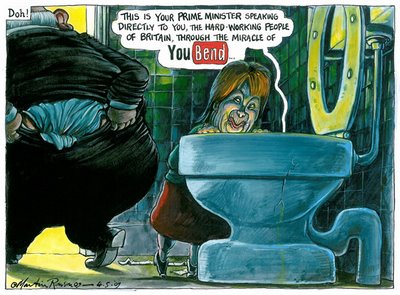The real story from Glasgow North East.
The story of the Glasgow North East by-election is categorically not that Labour won an overwhelming victory, especially considering the constituency is effectively a rotten borough for the party. A loss certainly would have been, though (a story, that is). It also isn't that the Conservatives received only 1,075 votes, or indeed that the British National Party was only 62 votes behind, although it might be if Chris Dillow's observation that heroin is probably more popular than the Tories was more widely disseminated. Nor is it that unsurprisingly, being a "celebrity", isn't an automatic vote winner: John Smeaton got 258 ballots while Mikey Hughes, a former Big Brother contestant, got 54. It also isn't, although it's again interesting, that the Socialist Labour vote completely collapsed on the 2005 result, when they got an astounding 4,036 votes, down this time to an appalling 47, most likely because Labour was on the ballot when it wasn't previously as a result of Michael Martin standing as the "Speaker".
The real story ought to be the catastrophically low turnout, a derisory 32.9% (Wikipedia has it as 33.2%). This can't be blamed on the lack of choice: all the main parties stood, as well as three various socialist sects, the BNP, three independents, and the Greens. While turnouts at by-elections are usually lower than at a general election, you might have thought it would have been the opposite in this instance, as there was far more choice on the ballot than previously due to the main opposition parties traditionally not standing against the Speaker, with their voters coming out this time when they might not have bothered previously. Instead it dropped from 45.8% in 2005, which was already well below the average of 61%. Did the expenses scandal have any impact? Unlikely. Instead it seems that the people of Glasgow North East, who were already poor before the recession, have lost all faith in politicians of every colour and creed. The only reassuring thing is that the British National Party didn't do better than their 1,013 votes. The current consensus is that the turnout is likely to go up next year when there is an actual, genuine alternative to the current government: Glasgow North East might yet prove to be the rule, not the exception.
Update: Slightly edited after some on Liberal Conspiracy responded with "Eh?" to the first paragraph, which is what happens when I'm trying to write something reasonably snappy and quickly to boot.
The real story ought to be the catastrophically low turnout, a derisory 32.9% (Wikipedia has it as 33.2%). This can't be blamed on the lack of choice: all the main parties stood, as well as three various socialist sects, the BNP, three independents, and the Greens. While turnouts at by-elections are usually lower than at a general election, you might have thought it would have been the opposite in this instance, as there was far more choice on the ballot than previously due to the main opposition parties traditionally not standing against the Speaker, with their voters coming out this time when they might not have bothered previously. Instead it dropped from 45.8% in 2005, which was already well below the average of 61%. Did the expenses scandal have any impact? Unlikely. Instead it seems that the people of Glasgow North East, who were already poor before the recession, have lost all faith in politicians of every colour and creed. The only reassuring thing is that the British National Party didn't do better than their 1,013 votes. The current consensus is that the turnout is likely to go up next year when there is an actual, genuine alternative to the current government: Glasgow North East might yet prove to be the rule, not the exception.
Update: Slightly edited after some on Liberal Conspiracy responded with "Eh?" to the first paragraph, which is what happens when I'm trying to write something reasonably snappy and quickly to boot.
Labels: by-elections, death of Labour, death of politics, Glasgow North East, politics


